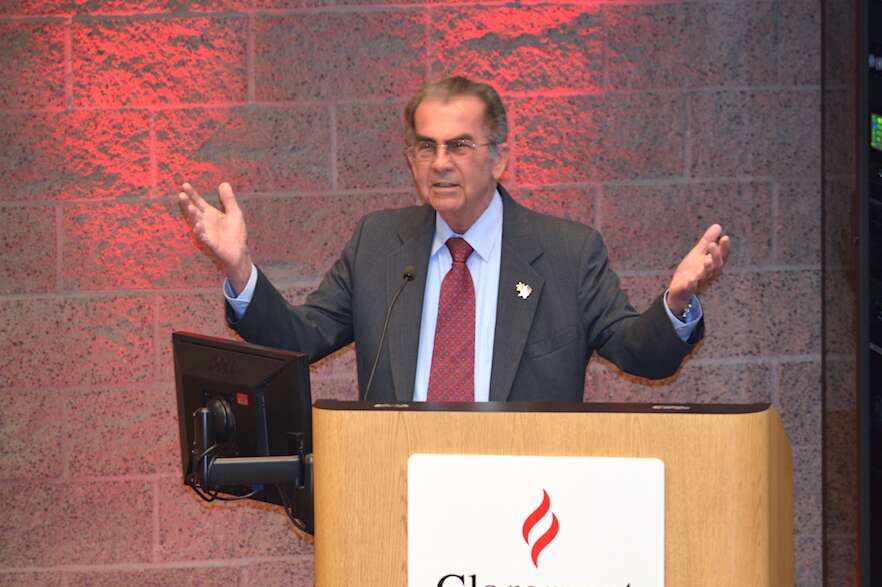Maldonado Institute assesses the global scene with a measured, unbiased approach

At a time when divisive rhetoric is affecting everything, from social media posts to the news reported on various media outlets, the university celebrated the launch of a much-needed alternative, the Maldonado Institute for International Security and Global Leadership.
Established by alumnus and former trustee Ernie Maldonado and his family, the institute will focus on producing apolitical and unbiased research about major issues related to international security as well as global leadership and cooperation.
“Apolitical” and “unbiased” were two very important qualities that Maldonado wants for this institute, he said, because too often today there is too much name-calling and biased reporting that influences—and skews—the flow of information and data.
“I think we all need to take a step back and look at the world from different points of view. It’s important to do that,” said Maldonado during a special inauguration celebration of the institute, which was held earlier this month during DPE’s International Studies Student Research Conference.
The new institute will offer a fresh, unbiased perspective on the challenges facing the global community.
The institute, which was established with funding from Maldonado and the Maldonado family, will launch a series of activities including visiting guest lecturers, research workshops, and student fellowship opportunities—along with travel allowance to attend important conferences—so that “our students become even more visible and more competitive in the job market,” said Professor Yi Feng, who is serving as the institute’s inaugural director.
“All of this wouldn’t have been possible without Ernie’s generosity and his vision, and his resolution to make CGU a leader in higher education,” Feng added.
Maldonado holds a PhD from CGU in Criminal Justice (1983) as well as an undergraduate degree in public management and public administration from Pepperdine University. His support of CGU over the years has taken many shapes and forms, from his regular attendance at school events to his service as a DPE Advisory Board member and as a member of CGU’s Board of Trustees. He and his wife Mary also established the Ernest M. and Mary J. Maldonado Endowed Leadership Fund at the university.
President Len Jessup hailed Maldonado for “serving as an ideal model of stewardship for our community.”
Jessup said that the institute’s ambitions to impact policy on an international scale and grow the university’s visibility among scholars on the world stage embodies the university’s overall mission to be a transformative leader in higher education.
“I can’t think of another way to make a bigger impact than what we’re doing with this institute. We are so appreciative,” Jessup told Maldonado during the launch celebration. Also speaking at the launch were Provost Patricia Easton and SSSPE Dean Michelle Bligh, who also saluted Maldonado’s commitment and loyalty to his alma mater.

Maldonado, whose career includes serving as a U.S. Air Force intelligence specialist and as a member of the L.A. County Sheriff’s Department, said his vision for the institute grows from this professional experience.
“When I was in law enforcement and the military,” he explained, “we always assessed the present and how it would affect the future. That’s what I want for this institute. The reason that I’ve created it is so that we can look at so many important topics like international security and global leadership and see where we are now and where we are going.”
As an illustration of Maldonado’s point, the launch celebration concluded with a panel discussion moderated by Professor Mark Abdollahian and featuring Professors Jean Lipman Blumen, Jacek Kugler, Sallama Shaker and Patrick James, Dornsife Dean’s Professor of International Relations and Director of the Center for International Studies at the USC.
Abdollahian led the panelists through a discussion of their specialty areas—peace and toxic leadership (Lipman Blumen), Middle East (Shaker), Asia/China (James), and the geopolitical chessboard (Kugler)—in order to get a sense, as Maldonado said, of “where we are now and where we are going.”